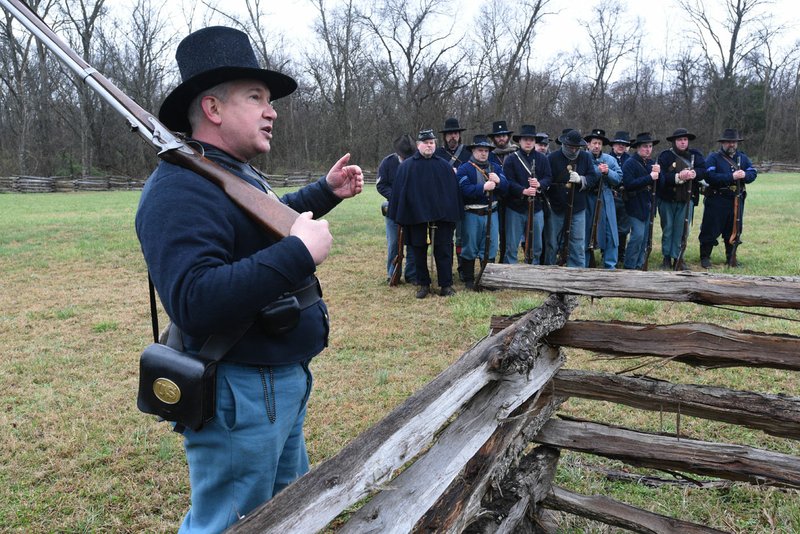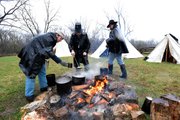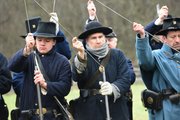PEA RIDGE -- Confederate Gen. Robert E. Lee is widely quoted as saying an army couldn't exist without music.
Lee's sentiment transcended not just the divisions of the Civil War, but most of military history, according to Troy Banzhaf, chief of interpretation at Pea Ridge National Military Park.
At a glance
Park officials plan to reshape sections of Pea Ridge National Military Park to make it more authentic, according to park superintendent Kevin Eads. Over the next year, the park will work with the Arkansas Highway and Transportation Department and the Federal Highway Administration to restore Telegraph Road to its historical appearance and construct a new parking lot farther from the battlefield, Eads said.
Source: Staff report
"Brass bands were very common during the Civil War, and both the Confederate and Union forces had bands," Banzhaf said. "Bands are something armies have always had."
Banzhaf said Brig. Gen. Samuel Ryan Curtis, the Union commander at the Battle of Pea Ridge, instructed his brass band to play "Yankee Doodle Dandy," "Dixie," and "The Arkansas Traveler" as his troops crossed into Arkansas in the spring of 1862.
To commemorate the 155th anniversary of the Battle of Pea Ridge, Banzhaf tapped Farmington band director Jim Spillars and the NWA Heritage Brass Ensemble for a concert Saturday.
The concert was held in tandem with living history events and guided hiking tours of Elkhorn Tavern, where troops from both sides sheltered during the battle.
"A lot of the music they played hasn't been heard in maybe 100 years," Banzhaf said. "It's original sheet music that Spillars arranged for a brass band."
Spillars, an eighth generation resident of Washington County, has been active with his family in Civil War re-enactments and activities at the park.
"We just want to tell the story of what happened in Northwest Arkansas," Spillars said. "Our goal is to help educate folks about what life was like for the men -- both sides -- because they are American veterans and their memory doesn't need to fade."
The Union victory at Pea Ridge helped the federal government maintain control over Missouri, which remained quasi-neutral during the Civil War, Banzhaf said.
A slave state that never seceded, Missouri supplied Union and Confederate outfits but would rather have been left alone, Banzhaf said.
The first shots were fired March 7, 1862. The battle took a turn March 8, when 10,000 Union soldiers, a contingent stretching nearly a mile in length, marched toward Huntsville Road and into Confederate defenses. Supported by 21 cannons, the Union overwhelmed the remaining Confederates and forced them to retreat.
The Confederate Army suffered roughly 2,000 casualties, compared with 1,384 losses for the Union, according to National Park Service data.
"The Union victory pretty well kept the Confederacy from capturing Missouri," Banzhaf said.
Spillars' ensemble, which includes current and former students as well as professional musicians, serenaded visitors with Civil War era pop music as a snow and sleet blanketed the battle field.
Their performance included a rendition of the "Pea Ridge March," a tune dedicated to Union Gen. Franz Siegel roughly a year after the battle.
Banzhaf said historians sometimes credit Civil War brass bands with the inaugural Battle of the Bands.
"You'll find accounts where Union and Confederate armies separated by a river where one band would play a song and the other side would respond with a song," Banzhaf said.
During the Battle of Stones River in December 1862, bands from both armies in Murfreesboro, Tenn., were separated by a river, and tried to "drown out the other," according to the National Park Service.
It wasn't until one of the bands played "Home Sweet Home" that "as if by common consent, all other airs ceased, and the bands of both armies, far as the ear could reach, joined in the refrain," according to an eye-witness account.
While each performance Saturday was followed by applause, the ensemble relied on a bit of Civil War modesty after the finale.
"It's been said Civil War music can be as beautiful as a choir of angels singing or as bad as a braying pack of mules," said tuba player Paul Johnston. "Hopefully we didn't sound like braying mules."
NW News on 03/12/2017


